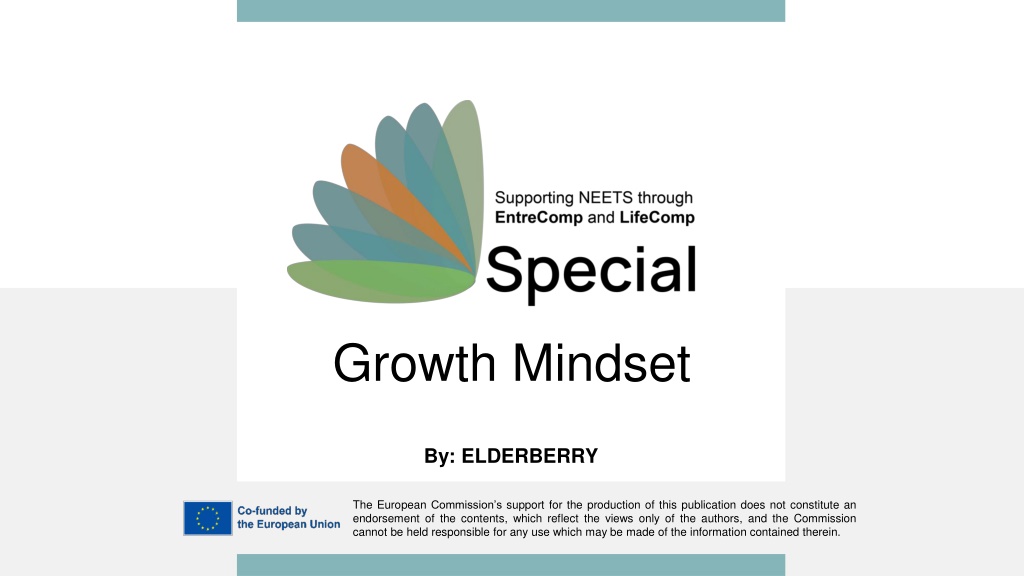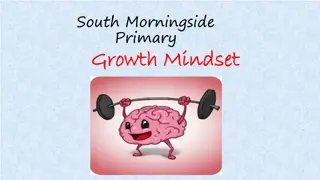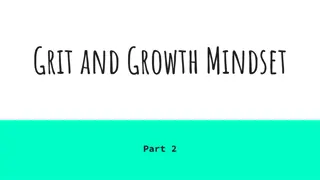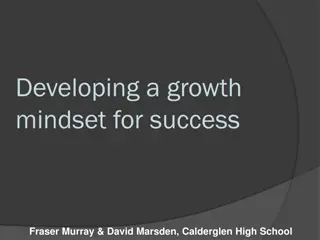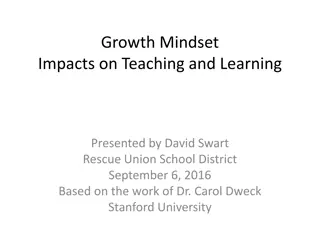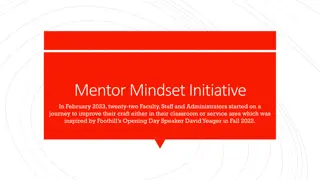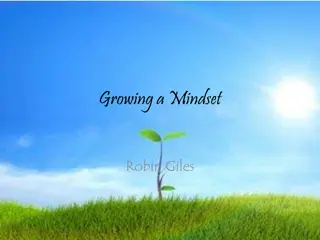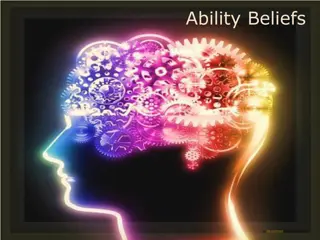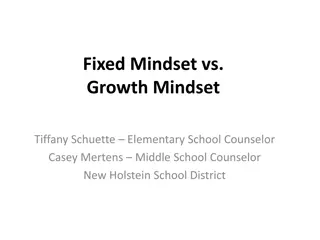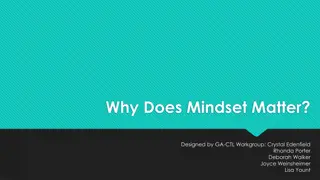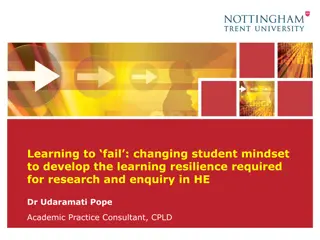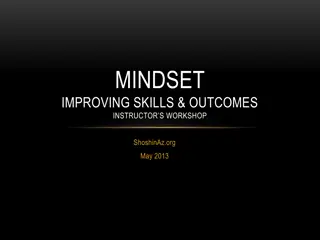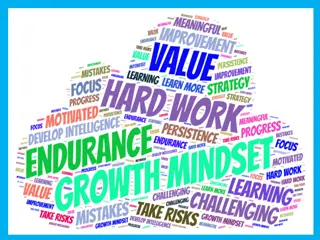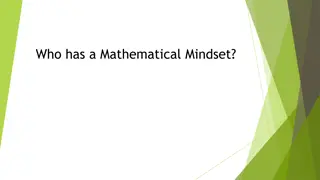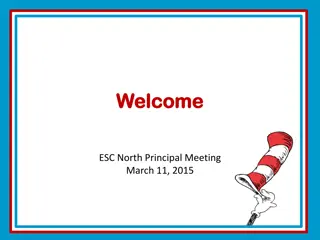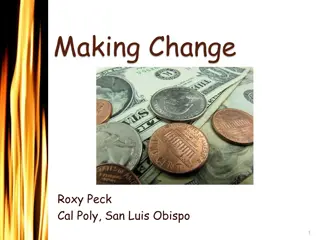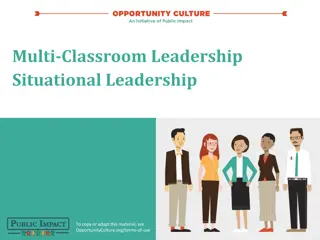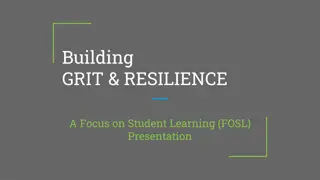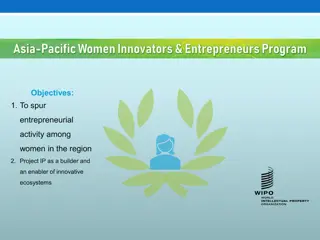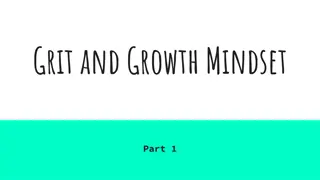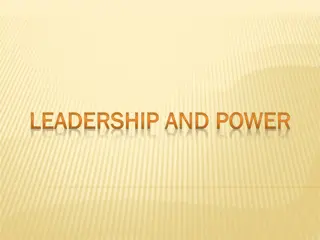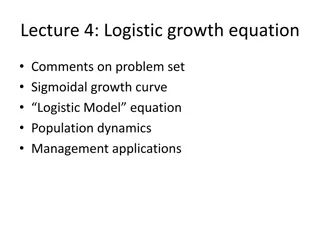Understanding the Power of Growth Mindset
A growth mindset, as defined by Professor Carol Dweck, emphasizes the belief that skills and talents can be developed through hard work and strategy. Contrasted with a fixed mindset that views abilities as innate, a growth mindset fosters a mindset of learning, growth, and resilience. Embracing a growth mindset can lead to increased opportunities, personal development, and a willingness to embrace challenges as learning experiences.
Download Presentation

Please find below an Image/Link to download the presentation.
The content on the website is provided AS IS for your information and personal use only. It may not be sold, licensed, or shared on other websites without obtaining consent from the author. Download presentation by click this link. If you encounter any issues during the download, it is possible that the publisher has removed the file from their server.
E N D
Presentation Transcript
Growth Mindset By: ELDERBERRY The European Commission s support for the production of this publication does not constitute an endorsement of the contents, which reflect the views only of the authors, and the Commission cannot be held responsible for any use which may be made of the information contained therein. The European Commission's support for the production of this publication does not constitute an endorsement of the contents, which reflect the views only of the authors, and the Commission cannot be held responsible for any use which may be made of the information contained therein.
Index 01 What is Growth Mindset 02 Ways to Nurture a Growth Mindset 03 Why Young People Need Growth Mindsets The European Commission's support for the production of this publication does not constitute an endorsement of the contents, which reflect the views only of the authors, and the Commission cannot be held responsible for any use which may be made of the information contained therein.
A mindset is the series of beliefs people hold about themselves, their self- perception. A growth mindset is a belief that you can develop your skills and talents through hard work, the right strategies, and guidance from others. What is a Growth Mindset The term growth mindset was coined by American psychologist Professor Carol Dweck in her 2006 book Mindset: The New Psychology of Success. Her work explored how an individual s underlying belief about their intelligence and ability to learn could impact their performance. Her studies show that those who believe they can develop their talents tend to achieve more than those who feel their abilities are innate and fixed. Those with a growth mindset see opportunities instead of obstacles, choosing to challenge themselves to learn more rather than sticking in their comfort zone. As Professor Dweck explains it: This growth mindset is based on the belief that your basic qualities are things you can cultivate through your efforts. Although people may differ in every which way in their initial talents and aptitudes, interests, or temperaments everyone can change and grow through application and experience . The European Commission's support for the production of this publication does not constitute an endorsement of the contents, which reflect the views only of the authors, and the Commission cannot be held responsible for any use which may be made of the information contained therein.
Growth mindset vs Fixed mindset! The opposite of a growth mindset is a fixed mindset. While the former is focused on self-improvement and development over time, a fixed mindset is essentially the belief that abilities are innate and fixed from birth. According to Dr Dweck s original research, those with a fixed mindset are more likely to seek opportunities to demonstrate strengths rather than those that could expose weaknesses. She goes on to say that such an approach to life can backfire. Although they take fewer risks, people with a fixed mindset can miss out on opportunities and chances to learn and grow. Those with a fixed mindset believe that each person inherits qualities such as intelligence, talents, and personality characteristics. Those who feel that their qualities are unique to their genetic makeup generally also feel that these characteristics stay stable throughout their lives. The European Commission's support for the production of this publication does not constitute an endorsement of the contents, which reflect the views only of the authors, and the Commission cannot be held responsible for any use which may be made of the information contained therein.
A Culture of Practice Ways to Nurture a Growth Mindset An important concept of having a growth mindset is realising that learning is a process and each moment is an opportunity to practise and improve. Growth occurs over time, and this is where it s hard to have a growth mindset. We want perfection, a first class, 100%. We fall into the trap of saying, I m not creative. I can t draw. I m not good at science. when that is NOT true! You simply haven t practised enough. Inherent in this culture of practice are moments of failure followed by a decision to persevere or give up. When working with NEETs this is where character development occurs. Youth (and adults too!) that learn to view failure as just another step in the learning process have achieved a growth mindset. Once you grasp that there is no limit to what they can achieve! The European Commission's support for the production of this publication does not constitute an endorsement of the contents, which reflect the views only of the authors, and the Commission cannot be held responsible for any use which may be made of the information contained therein.
Shift in Vocabulary! Cultivating a growth mindset requires a change in vocabulary to bring about a focus on the process of growth and improvement. Even responses to moments of success can be shifted. Another example: A youngster confronts a maths problem (insert any task or skill specific to the person) that they successfully complete. Instead of solely praising their achievement, bring attention to the process. Great work! I see the practice you put in is really paying off! I wonder what will happen if you keep practising? Consider a time when you see a little child building something with Lego When the child completed the task, you could say, Great job, you did it! You got it right! However, to nurture a growth mindset you would say, Wow! You tried four different times to build that house. I noticed you didn t give up. You kept working until you got it! Well done! The European Commission's support for the production of this publication does not constitute an endorsement of the contents, which reflect the views only of the authors, and the Commission cannot be held responsible for any use which may be made of the information contained therein.
Ten ways to 1. Gently redirect negative thoughts to empowering thoughts. Reframe mistakes as lessons. It s not a problem, it s an opportunity. Keep learning and growing. Acknowledge your accomplishments. 6. Replace judgement with compassion. develop a growth mindset 2. 7. Value the attempt more than the result. 3. 8. Take baby steps. 4. 9. Leave your comfort zone. 5. 10. Have a I don t have (goal) YET attitude. The European Commission's support for the production of this publication does not constitute an endorsement of the contents, which reflect the views only of the authors, and the Commission cannot be held responsible for any use which may be made of the information contained therein.
Rationale and benefits of having Growth Mindsets With a Growth Mindset, you are more realistic in focusing on doing the hard work. This means that the chances of you doing the hard work are much higher than when you have a Fixed Mindset. That means that you will be more successful if you have a Growth Mindset Why young people need a Growth Mindset A Changing World Need for New Thinking With technology and business models changing rapidly, embracing a growth mindset is vital to career success. Workers will need to continuously learn new skills to remain competitive as automation technologies, including artificial intelligence, become more prevalent. Entrepreneurial competencies Entrepreneurial competencies are the knowledge, skills and attitudes that help a person start a company. These competencies encapsulate the mindset and know-how for identifying opportunities, creative problem solving, taking initiative, communicating, reflecting, adapting, and attitudes such as curiosity, open-mindedness, proactivity, flexibility, determination, and resilience. While some believe that entrepreneurs are born, there is robust evidence that such entrepreneurial competencies and the entrepreneurial mindset can be taught. The European Commission's support for the production of this publication does not constitute an endorsement of the contents, which reflect the views only of the authors, and the Commission cannot be held responsible for any use which may be made of the information contained therein.
Growth Mindset A growth mindset is the belief that your skills and abilities are not set in stone. Just as mighty oaks grow from tiny acorns, our talents might start small, but they have the potential to grow huge. Inclusion and promote individuality Inclusion is a system for making sure organisations are welcoming at every level to every individual. Inclusion is about finding like-mindedness in our differences and embracing individuals unique ideas and ideals. Glossary Fixed mindset People with a fixed mindset are more likely to believe that their ability and intelligence can t be changed; that they're either good at something or not. Cultivate Resilience Individual with growth mindset, then take the time and make the effort to develop it. Persist and opportunities will come. Open-mindset A growth mindset requires leaders to be more inclusive to the unique needs and perspectives of others. Growth requires more than profits; it requires a clear understanding of human capital assets. The European Commission's support for the production of this publication does not constitute an endorsement of the contents, which reflect the views only of the authors, and the Commission cannot be held responsible for any use which may be made of the information contained therein.
Quest 1: What is a Growth Mindset Introduction: What s this all about? Task: What s the activity? A growth mindset, as conceived by Stanford psychologist Carol Dweck and colleagues, is the belief that a person's capacities and talents can be improved over time Growth mindset describes a way of viewing challenges and setbacks. People who have a growth mindset believe You are to undertake a short quiz, follow the link here to that even if they struggle with certain skills, their abilities do the Quiz: Growth Mindset Quiz Is Your Mindset aren t set in stone. They think that with work, their skills can Fixed Or Growth? (wdhb.com) improve over time. The European Commission's support for the production of this publication does not constitute an endorsement of the contents, which reflect the views only of the authors, and the Commission cannot be held responsible for any use which may be made of the information contained therein.
Quest 1: What is a Growth Mindset Learning outcomes: What will I learn? Process: What am I going to do? Understanding and managing interactions and Watch the Video Growth Mindset by Carol Dweck conversations in different socio-cultural contexts and (founder of the Growth Mindset) concept, that will domain-specific situations. provide you with a visual explanation of what a growth mindset is and what it entails to develop on. That video The planning, organising, monitoring, and reviewing of one s own learning. will help you with the follow up questions, remember the follow up questions are an addition and you can Developing creative ideas, synthesising and combining concepts and information from different sources in view of solving problems. complete them on your own or with a friend/colleague. The European Commission's support for the production of this publication does not constitute an endorsement of the contents, which reflect the views only of the authors, and the Commission cannot be held responsible for any use which may be made of the information contained therein.
Quest 1: What is a Growth Mindset Conclusion: What will I take home? Having a growth mindset means recognising our ability to change who we are, what we know, and how we think. Our personal qualities and abilities are not static; they remain open to change from outside and within. For many, this may offer a significant shift in their outlook of who they are and can become. Recognising our capacity for growth and development places accountability on ourselves to take charge and develop in the direction of our choosing. When working on ourselves, we should review the theory and try out the questions and exercises to understand which mindset you rely on. Then identify what changes you wish to make to enter the growth zone. The choice is ultimately yours, but a growth mindset may open new opportunities for you that may have previously seemed impossible. The European Commission's support for the production of this publication does not constitute an endorsement of the contents, which reflect the views only of the authors, and the Commission cannot be held responsible for any use which may be made of the information contained therein.
Quest 2: Ways to Nurture a Growth Mindset Introduction: What s this all about? Task: What s the activity? You have come for a job interview in a fast-paced product design company you have been set the following activities: Our minds can be our biggest assets or our biggest obstacles in life. You can cultivate beliefs that work The Crumpled Reminder Activity This brief exercise invites you to write down a recent setback you ve experienced then reassess your understanding of failure. for you and lead to your success, or they can work against you and your best interests without you even realising it. A Cafe Discussion Task These prompts encourage a discussion of the opportunities that arise from failure. When you believe that your potential is unlimited and that good things are always coming your way, you The Mistake Game This exercise is designed to help young people talk about mistakes openly, helping them to embrace them and use them for learning. are practising a growth mindset. The European Commission's support for the production of this publication does not constitute an endorsement of the contents, which reflect the views only of the authors, and the Commission cannot be held responsible for any use which may be made of the information contained therein.
Quest 2: Ways to Nurture a Growth Mindset Learning outcomes: What will I learn? Process: What am I going to do? Awareness of potential biases in the data and one s personal limitations, while collecting valid and reliable information and ideas from diverse and reputable sources. Awareness of and confidence in one's own and others abilities to learn, improve and achieve with work and dedication. You can work in a small group or on your own and go Understanding that learning is a lifelong process that through the ways to nurture your mindset requires openness, curiosity, and determination. The European Commission's support for the production of this publication does not constitute an endorsement of the contents, which reflect the views only of the authors, and the Commission cannot be held responsible for any use which may be made of the information contained therein.
Quest 2: Ways to Nurture a Growth Mindset Conclusion: What will I take home? So, can you develop a growth mindset? If you tried one of the activities, we suggested you will see you become more resilient when dealing with problems. Research suggests that with the right attitude, we can improve the way we deal with life s difficulties. The European Commission's support for the production of this publication does not constitute an endorsement of the contents, which reflect the views only of the authors, and the Commission cannot be held responsible for any use which may be made of the information contained therein.
Quest 3: Why Young People Need a Growth Mindset Introduction: What s this all about? Task: What s the activity? Having a growth mindset means believing that learning is a lifelong process, that success isn t limited to our academic life, and that we can always learn something new. However, if you re constantly second-guessing yourself and you re already convinced that you can never grow any further in your career or personal life, then you need to understand why it s essential to have a growth mindset. You have come for an interview in a fast-paced product development company, and you are asked why is it important to have a growth mindset? You are required to do a 15 minute presentation either on Powerpoint or use flipchart. Having a growth mindset can have real benefits. It helps people reframe their approach to challenges and stay motivated to work to improve skills. Instead of thinking I can t do this, they think I can t do it yet. The European Commission's support for the production of this publication does not constitute an endorsement of the contents, which reflect the views only of the authors, and the Commission cannot be held responsible for any use which may be made of the information contained therein.
Quest 3: Why Young People Need a Growth Mindset Learning outcomes: What will I learn? Process: What am I going to do? To do your 15 minutes presentation first you will need to: I can judge my strengths and weaknesses and those of Step 1- explain what Growth Mindset is, activity 1 in this others in relation to opportunities for creating value. module will provide you with some valuable insight (3 mins) Step 2 - look at activity 2 in this module that provides details I can critically evaluate the risks associated with an on how to develop growth mindset; summarise this in your idea that creates value, taking into account a variety of presentation (2 mins) factors. Step 3 - spend the remaining time in your presentation in I actively face challenges, solve problems and seize explaining why it is important to have a growth mindset (10 opportunities to create value mins) The European Commission's support for the production of this publication does not constitute an endorsement of the contents, which reflect the views only of the authors, and the Commission cannot be held responsible for any use which may be made of the information contained therein.
Quest 3: Why Young People Need a Growth Mindset Conclusion: What will I take home? Having a growth mindset can be highly beneficial for individuals, organisations, and communities. As you learned above, there are many reasons why it is important to have a growth mindset. The first reason is that this mindset allows you to take calculated risks and make changes giving you more confidence in your decisions and actions so that you never have to worry about your past mistakes holding you back. Second, a growth mindset helps you to improve all areas of your life. It allows you to become a better student, a better parent, a better employee, and even a better citizen. The final reason why having a growth mindset is essential is because it helps you to realise your full potential and live a happier and more fulfilling life. With a growth mentality, you ll be able to see your weaknesses as strengths and use them as a stepping stone toward your goals! The European Commission's support for the production of this publication does not constitute an endorsement of the contents, which reflect the views only of the authors, and the Commission cannot be held responsible for any use which may be made of the information contained therein.
Self-assessment Multiple-choice questions: consolidate your learning Question 1: People with a growth mindset like thinking of original ways to do things a) True b) False Question 2: People with Growth mindset when they make a mistake, they try to figure out some learning. Question 3: People with Growth mindset see mistakes as valuable learning opportunities. a) True b) False a) True b) False The European Commission's support for the production of this publication does not constitute an endorsement of the contents, which reflect the views only of the authors, and the Commission cannot be held responsible for any use which may be made of the information contained therein.
Self-assessment Multiple-choice questions: consolidate your learning Question 5: People with Growth mindset like trying new things, even if they don t do them well. Question 4: Your personality is pretty much set in stone and there isn't much you can do to change it. a) True b) False a) True b) False The European Commission's support for the production of this publication does not constitute an endorsement of the contents, which reflect the views only of the authors, and the Commission cannot be held responsible for any use which may be made of the information contained therein.
Self-assessment Multiple-choice questions: solutions Question 1: Question 2: Question 3: People with a growth mindset like thinking of original ways to do things People with Growth mindset see mistakes as valuable learning opportunities. People with Growth mindset when they make a mistake, they try to figure out some learning. True True True The European Commission's support for the production of this publication does not constitute an endorsement of the contents, which reflect the views only of the authors, and the Commission cannot be held responsible for any use which may be made of the information contained therein.
Self-assessment Multiple-choice questions: solutions Question 5: Question 4: Your personality is pretty much set in stone and there isn't much you can do to change it. People with Growth mindset like trying new things, even if they don t do them well. False True The European Commission's support for the production of this publication does not constitute an endorsement of the contents, which reflect the views only of the authors, and the Commission cannot be held responsible for any use which may be made of the information contained therein.
Summing up A growth mindset means one embraces challenges, persists in the face of setbacks, takes responsibility for their words and actions, and acknowledges that effort is the path toward mastery. It is basically the reason why practice makes perfect." While having a growth mindset can be helpful for everyone in general, it is especially important for young people who are still in the early stages of their education and careers, to build the habits and attitudes that will serve as a foundation for the years ahead. B A The definition of growth mindset is much simpler than it sounds. In a nutshell, it is the belief that skills and intelligence can be improved with effort and persistence. People with a growth mindset embrace challenges, stay resilient in the face of difficulties, learn from constructive criticism, and seek out inspiration in others success. D C Having a growth mindset means believing that learning is a lifelong process, that success isn t limited to our academic life, and that we can always learn something new. The European Commission's support for the production of this publication does not constitute an endorsement of the contents, which reflect the views only of the authors, and the Commission cannot be held responsible for any use which may be made of the information contained therein.
Thank you! Continue your training path at www.projectspecial.eu! The European Commission's support for the production of this publication does not constitute an endorsement of the contents, which reflect the views only of the authors, and the Commission cannot be held responsible for any use which may be made of the information contained therein.
